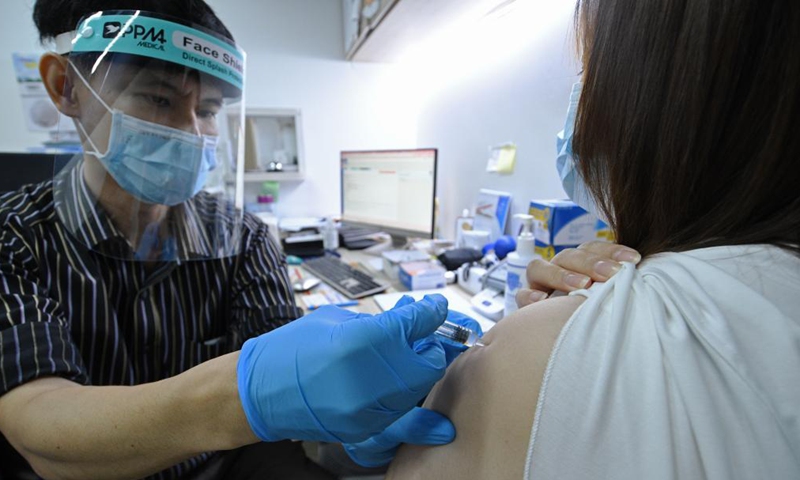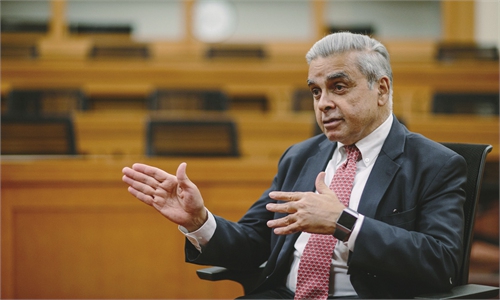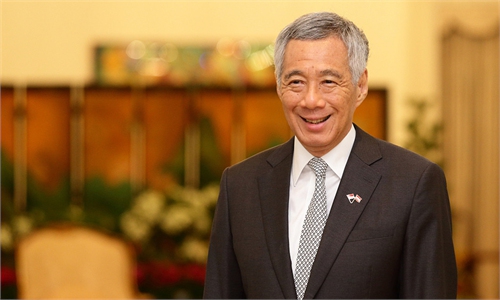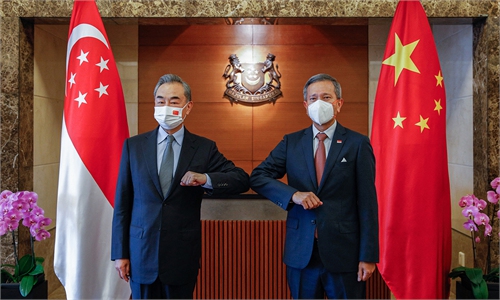
A doctor injects a woman with Sinovac COVID-19 vaccine at a private clinic in Singapore on July 6, 2021. Photo: Xinhua
Chinese COVID-19 vaccines producers Sinopharm and Sinovac will expand supply to Singapore while the country is studying the possibility of using non-mRNA vaccines as booster shots.
The move came during the tour by Chinese State Councilor and Foreign Minister Wang Yi to some Southeast Asian countries, including Singapore, Cambodia and Vietnam, to explore further areas of cooperation, such as mutual recognition of health codes and development of comprehensive vaccine supply-chain .
A batch of 31,600 doses of Sinopharm's inactivated vaccines arrived on September 10 and were dispatched to 46 private clinics in the country, taking the number of hospitals and private clinics in Singapore providing Sinopharm shots to over 50, Sinopharm announced in a statement on Wednesday, adding that by the end of October, the number would exceed 100.
The Global Times also learned from Sinovac Biotech on Wednesday that the company is fulfilling the demand from Singapore residents for vaccines with an additional 101,000 doses of their inactivated COVID-19 vaccine CoronaVac.
The doses will arrive in Singapore on Sept 20 and will be available at Livingstone Health's primary healthcare arm, Phoenix Medical, as well as at Ardennes Health Screening and Radiology Centre, starting September 24.
The vaccines will also be available at 13 other primary care clinics in the country.
So far, only Moderna and Pfizer-BioNTech's RNA COVID-19 vaccines are under Singapore's national vaccination program.
About 80 percent of the country's population has been vaccinated by the end of August and the health authority's expert committee has recommended that seniors, aged 60 and above, should receive a booster jab six to nine months after their second dose, while immunocompromised individuals should get a booster two months after their second dose, according to media reports.
Sinovac's vaccine was allowed to be provided in 24 private health clinics by the Singaporean health authority in June after the World Health Organization authorized it for emergency use.
Singapore's Ministry of Health announced in August that its stock of CoronaVac® would be depleted after restrictions in supplies for those receiving their second doses and that it would facilitate the ordering of more doses by private healthcare institutions. The Ministry had earlier procured 200,000 doses of the vaccine, of which 170,000 were made available to the public at primary care clinics under the Special Access Route framework, read a statement from Sinovac.
Some Western media had underlined the differentiation of Singaporean residents with the Sinovac jab in terms of local vaccination perks, such as testing exemptions, implying that the Singaporean government is discriminating against recipients of Chinese vaccines.
In a previous response, Singapore's Health Sciences Authority said it is still awaiting additional data on CoronaVac, especially data on the contagious Delta variant, before it can be granted approval.
During a meeting with Singaporean Deputy Prime Minister, Heng Swee Keat, Wang said that China is willing to cooperate with Singapore on medical research and development and virus research, and both parties oppose vaccine nationalism.
The Singaporean side lauded China's active efforts to conduct vaccine cooperation with external parties, share experiences on the COVID-19 response with other countries and is willing to further step up cooperation with China in the field.



